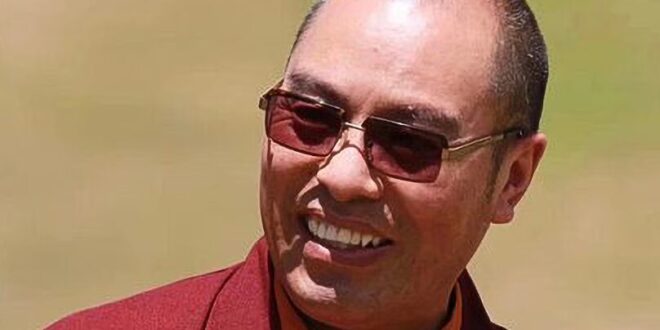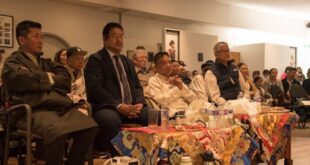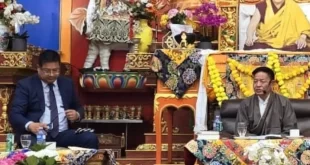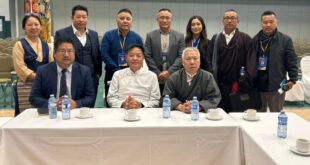Dharamshala: The Central Tibetan Administration has confirmed reports that well-respected Tulku Hungkar Dorje, the throne holder of Lungngon Monastery in Gade County, Golog, in Tibet’s traditional province of Amdo, has passed away after going missing for a prolonged period. According to reliable sources, Chinese officials have notified senior religious figures at Lungngon Monastery of his death on 2 April 2025 but have refused to return his body or provide details about the circumstances of his death.
Tulku Hungkar Dorje, a widely respected religious leader and philanthropist, was reportedly detained by Chinese authorities in early 2024. In August 2024, Chinese officials claimed he had “gone missing” shortly after he gave a public teaching on 21 July 2024. Subsequently, conflicting reports emerged about his whereabouts. The confirmation of his suspicious demise represents the latest case in China’s ongoing campaign of repression against Tibetan religious and cultural leaders.
Pattern of Targeting Tibetan Leaders
Sources indicate that Chinese authorities targeted Tulku Hungkar Dorje on fabricated charges after he declined to arrange an elaborate reception for the Chinese government-appointed Panchen Lama during his visit to the Golog region. Additional accusations included “disobeying higher authorities” for his philanthropic work of establishing monasteries and schools, and “causing disturbances” for advocating for the rights and freedom of marginalized Tibetans under the repressive Chinese rule.
The death of a well-respected Tibetan religious figure follows a disturbing pattern of Chinese authorities targeting influential Tibetan figures who promote Tibetan culture, language, and identity. The detention, torture, and killing of respected leaders like Tulku Hungkar Dorje is a deliberate strategy to silence those who advocate for Tibetans’ fundamental rights.
Tibetans inside Tibet have taken to social media platforms to express their grief following the death of Tulku Hungkar Dorje. Many expressed emotional tributes highlighting his contributions in preserving Tibetan culture and providing educational opportunities to thousands of underprivileged children, but few expressed doubts, reflecting widespread suspicion of the circumstances surrounding the revered religious leader’s death in Chinese custody.
Humanitarian Work and Cultural Preservation
Born in 1969, Tulku Hungkar Dorje was known for his extensive humanitarian and educational efforts in Tibet. He established the Gesar Philanthropic Foundation in 2004 and founded approximately 14 primary and secondary schools providing free education to thousands of Tibetan children from nomadic and agricultural communities. In 2007, with permission from local authorities, he established the Hungkar Dorje Nationalities Technical High School with approximately 1,000 teachers and students.
His work in preserving Tibetan Buddhist teachings, language, and culture made him a beloved figure among Tibetans both within Tibet and in exile. After studying at Drepung Gomang Monastery in India from 1989 to 1994 and briefly in the United States, he returned to Tibet, where he was enthroned as the tenth throne holder of Lungngon Monastery in 2002.
He wrote several books, including “Tangkas in Golog: The Tangka Album of Lung Ngon Monastery” and “The Melodious Sound of the Laughter of the Vidyadharas of the Three Lineages.”
International Concern and Call for Accountability
The Central Tibetan Administration calls on the international community to condemn this extrajudicial killing and demand transparency from Chinese authorities regarding the circumstances of Tulku Hungkar Dorje’s detention and death. It highlights the ongoing and ever-growing choking of human rights in Tibet, where Tibetans live under constant fear of arrest and persecution for the slightest expression of Tibetan identity. It also underscores the fact that those who peacefully advocate for cultural and religious freedom continue to face arbitrary detention, torture, and execution. The Central Tibetan Administration urges international human rights organizations and governments to press China for accountability and to respect the fundamental rights and freedoms of the Tibetan people.
- Filed by UN, EU, and the Human Rights Desk, Tibet Advocacy Section, DIIR
This report is based on information provided by verified sources within Tibet and reliable reports published by exile Tibetan media. Due to China’s restrictions on press freedom in Tibet, some details remain difficult to independently confirm.




